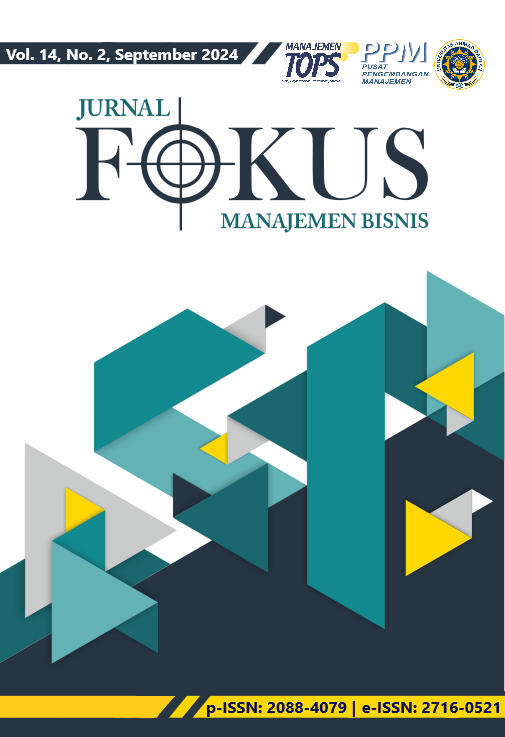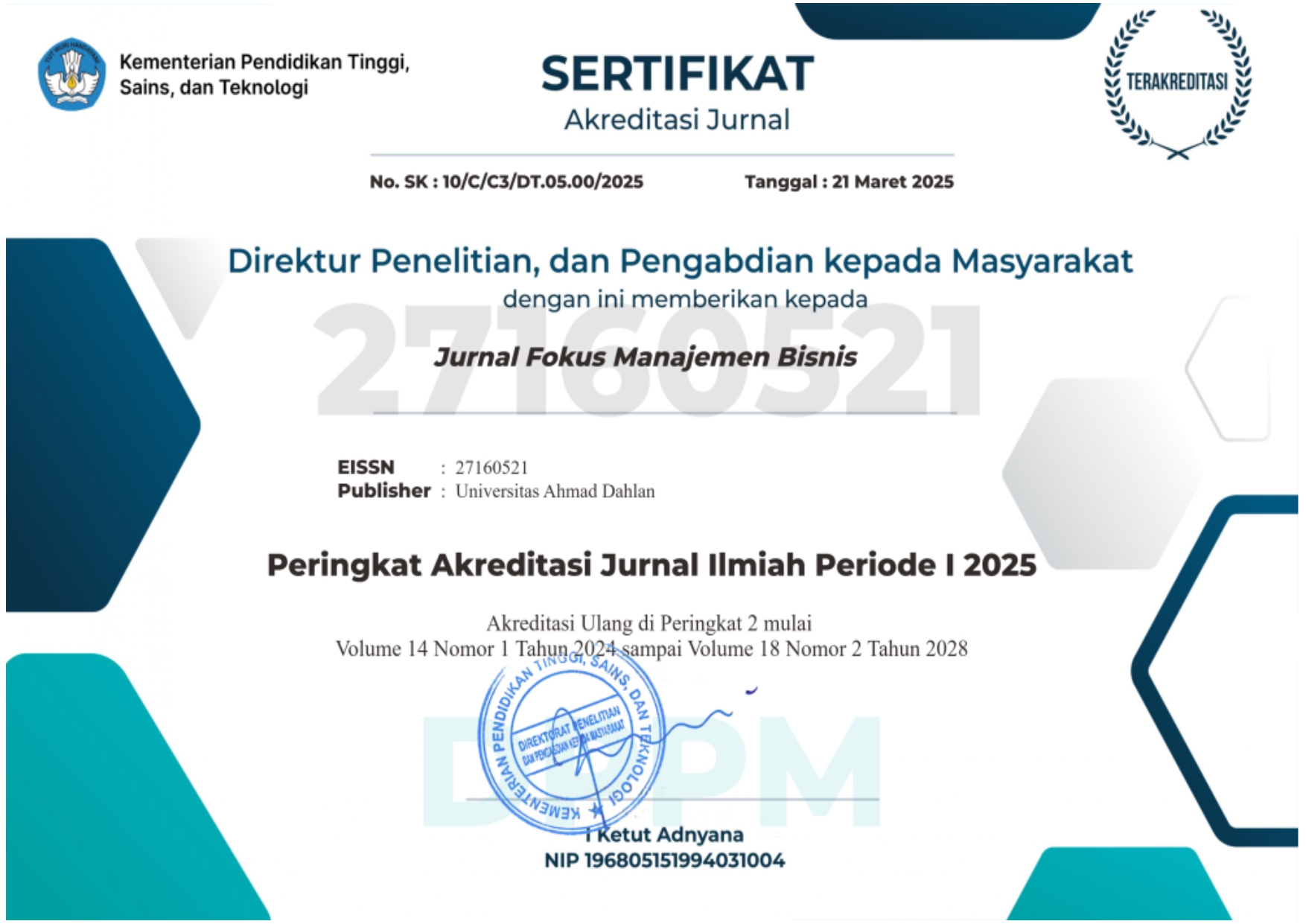Mapping the Wuling vehicle market with K-Means Clustering: An effective digital marketing strategy
DOI:
https://doi.org/10.12928/fokus.v14i2.10026Abstract
This study focuses on Indonesia’s automotive industry sector, which is currently experiencing growth, particularly in terms of Wuling's contribution to the economy through sales. The aim is to identify customer clusters for Wuling vehicle and the marketing mix strategy after the most dominant customer cluster for Wuling vehicle. The research method used was a quantitative survey, which involved collecting data from 111 potential Wuling customer using purposive sampling and data collection through questionnaires. The analysis included an F-Test to examine the differences between clusters. The results show that the clustering of Wuling customer using the K-Means Clustering method successfully divided them into three different clusters, namely Perfectionist, Easy Going, and Beginner, with the Easy Going being the most dominant. Therefore, it is necessary to adjust marketing strategies to focus more on the needs and preferences of the Easy Going, including optimizing the use of promotion channels that have been proven effective, such as direct marketing and sales websites. Thus, this study emphasizes the importance of applying the K-Means Clustering method in automotive market segmentation, providing valuable insights for Wuling to formulate more effective and relevant marketing strategies to meet the diverse needs of customer in a dynamic market.
References
Ahmed, M., Seraj, R., & Islam, S. M. S. (2020). The k-means algorithm: A comprehensive survey and performance evaluation. Electronics (Switzerland), 9(8). https://doi.org/10.3390/electronics9081295
Alawadh, M., & Barnawi, A. (2024). A consumer behavior analysis framework toward improving market performance indicators: Saudi’s retail sector as a case study. Journal of Theoretical and Applied Electronic Commerce Research, 19(1), 152–171. https://doi.org/10.3390/jtaer19010009
Alibuhtto, M. C., & Mahat, N. I. (2020). Distance based k-means clustering algorithm for determining number of clusters for high dimensional data. Decision Science Letters, 9(1). https://doi.org/10.5267/j.dsl.2019.8.002
Badica, A. L., & Mitucă, M. O. (2021). IOT-Enhanced Digital Marketing Conceptual Framework. BRAIN. Broad Research in Artificial Intelligence and Neuroscience, 12(4). https://doi.org/10.18662/brain/12.4/262
Badri, F., & Habibi, A. (2022). Implementasi metode k-means clustering analysis pada pengelompokan pengangguran di Indonesia sebagai dampak dari pandemi covid-19. ILKOMNIKA: Journal of Computer Science and Applied Informatics, 4(2). https://doi.org/10.28926/ilkomnika.v4i2.471
Carpino, C., Mora, D., & De Simone, M. (2019). On the use of questionnaire in residential buildings. A review of collected data, methodologies and objectives. Energy and Buildings, 186. https://doi.org/10.1016/j.enbuild.2018.12.021
Chakraborty, D., Chaisse, J., & Pahari, S. (2020). Global auto industry and product standards: A critical review of India’s economic and regulatory experience. Journal of International Trade Law and Policy, 19(1). https://doi.org/10.1108/JITLP-10-2019-0063
Chandrashekar, C., Agrawal, P., Chatterjee, P., & Pawar, D. S. (2021). Development of e-rickshaw driving cycle (ERDC) based on micro-trip segments using random selection and k-means clustering techniques. IATSS Research, 45(4). https://doi.org/10.1016/j.iatssr.2021.07.001
Chaudhry, M., Shafi, I., Mahnoor, M., Vargas, D. L. R., Thompson, E. B., & Ashraf, I. (2023). A systematic literature review on identifying patterns using unsupervised clustering algorithms: A data mining perspective. Symmetry, 15(9). https://doi.org/10.3390/sym15091679
Chen, A. H. L., Liang, Y. C., Chang, W. J., Siauw, H. Y., & Minanda, V. (2022). RFM model and k -means clustering analysis of transit traveller profiles: A case study. Journal of Advanced Transportation, 2022. https://doi.org/10.1155/2022/1108105
Chen, L., Chen, G., Wang, S., & Jiang, L. (2023). The effect of perfectionism on consumers’ intentions to purchase imperfect products. Behavioral Sciences, 13(3). https://doi.org/10.3390/bs13030269
Chin, V., & Viriyasuebphong, P. (2016). Cultural impact on decision making-styles among Cambodian. European Journal of Business and Management, 8(20).
Damit, D. H. D. A., Harun, A., Martin, D., Othman, B. J., Othman, B., & Ahmad, H. (2019). What makes a non-muslim purchase halal food in a muslim country? An application of theory of planned behaviour. Management Science Letters, 9(12). https://doi.org/10.5267/j.msl.2019.7.003
Darwis, Putra, B. A., Guido, B., Baharuddin, A., & Burhanuddin. (2020). The ASEAN economic community and determinant factors in the expansion of indonesian businessmen in the Southeast Asian Market. Academy of Entrepreneurship Journal, 26(4).
De Silva, M., Wang, P., & Kuah, A. T. H. (2021). Why wouldn’t green appeal drive purchase intention? Moderation effects of consumption values in the UK and China. Journal of Business Research, 122. https://doi.org/10.1016/j.jbusres.2020.01.016
Dwivedi, Y. K., Ismagilova, E., Hughes, D. L., Carlson, J., Filieri, R., Jacobson, J., Jain, V., Karjaluoto, H., Kefi, H., Krishen, A. S., Kumar, V., Rahman, M. M., Raman, R., Rauschnabel, P. A., Rowley, J., Salo, J., Tran, G. A., & Wang, Y. (2021). Setting the future of digital and social media marketing research: Perspectives and research propositions. International Journal of Information Management, 59. https://doi.org/10.1016/j.ijinfomgt.2020.102168
Goyal, M. A., Bhong, S., Kumbhare, P., & Bharadkar, R. (2021). The new era of digital marketing: A literature review. Pjaee, 18(10).
Hall, A., & Towers, N. (2017). Understanding how millennial shoppers decide what to buy: Digitally connected unseen journeys. International Journal of Retail and Distribution Management, 45(5). https://doi.org/10.1108/IJRDM-11-2016-0206
Hardman, S., Fleming, K., Kare, E., & Ramadan, M. (2021). A perspective on equity in the transition to electric vehicle. MIT Science Policy Review. https://doi.org/10.38105/spr.e10rdoaoup
Hassani, H., Beneki, C., Unger, S., Mazinani, M. T., & Yeganegi, M. R. (2020). Text mining in big data analytics. Big Data and Cognitive Computing, 4(1). https://doi.org/10.3390/bdcc4010001
Hou, K., Hou, T., & Cai, L. (2021). Public attention about covid-19 on social media: An investigation based on data mining and text analysis. Personality and Individual Differences, 175. https://doi.org/10.1016/j.paid.2021.110701
Ivanova, G., & Moreira, A. C. (2023). Antecedents of electric vehicle purchase intention from the consumer’s perspective: A systematic literature review. Sustainability (Switzerland), 15(4). https://doi.org/10.3390/su15042878
Kasim, N. A., Nuawi, M. Z., Ghani, J. A., Rizal, M., Ngatiman, N. A., & Haron, C. H. C. (2021). Enhancing clustering algorithm with initial centroids in tool wear region recognition. International Journal of Precision Engineering and Manufacturing, 22(5). https://doi.org/10.1007/s12541-020-00450-5
Katsikeas, C., Leonidou, L., & Zeriti, A. (2020). Revisiting international marketing strategy in a digital era: Opportunities, challenges, and research directions. International Marketing Review, 37(3). https://doi.org/10.1108/IMR-02-2019-0080
Luo, B., Li, L., & Sun, Y. (2022). Understanding the influence of consumers’ perceived value on energy-saving products purchase intention. Frontiers in Psychology, 12. https://doi.org/10.3389/fpsyg.2021.640376
Maghfiroh, M. F. N., Pandyaswargo, A. H., & Onoda, H. (2021). Current readiness status of electric vehicles in indonesia: Multistakeholder perceptions. Sustainability (Switzerland), 13(23). https://doi.org/10.3390/su132313177
Mehta, V., Bawa, S., & Singh, J. (2020). Analytical review of clustering techniques and proximity measures. Artificial Intelligence Review, 53(8). https://doi.org/10.1007/s10462-020-09840-7
Meszaros, F., Shatanawi, M., & Ogunkunbi, G. A. (2020). Challenges of the electric vehicle markets in emerging economies. Periodica Polytechnica Transportation Engineering, 49(1). https://doi.org/10.3311/PPTR.14037
Nerurkar, V., Barge, P., Bhatt, V., Rastogi, S., & Agarwal, B. (2023). Factors influencing consumer decision to purchase a car. Marketing and Management of Innovations, 14(1). https://doi.org/10.21272/mmi.2023.1-03
Niroomand, N., Bach, C., & Elser, M. (2021). Vehicle dimensions based passenger car classification using fuzzy and non-fuzzy clustering methods. Transportation Research Record, 2675(10). https://doi.org/10.1177/03611981211010795
Nwogbaga, N. E. (2020). A review of big data clustering methods and research issues. International Journal of Science and Research (IJSR), 9(5).
Othman, B. A., Harun, A., De Almeida, N. M., & Sadq, Z. M. (2021). The effects on customer satisfaction and customer loyalty by integrating marketing communication and after sale service into the traditional marketing mix model of umrah travel services in Malaysia. Journal of Islamic Marketing, 12(2). https://doi.org/10.1108/JIMA-09-2019-0198
Paiola, M., & Gebauer, H. (2020). Internet of things technologies, digital servitization and business model innovation in btob manufacturing firms. Industrial Marketing Management, 89. https://doi.org/10.1016/j.indmarman.2020.03.009
Purnomo, Y. J. (2023). Digital marketing strategy to increase sales conversion on e-commerce platforms. Journal of Contemporary Administration and Management (ADMAN), 1(2). https://doi.org/10.61100/adman.v1i2.23
Ran, X., Zhou, X., Lei, M., Tepsan, W., & Deng, W. (2021). A novel kmeans clustering algorithm with a noise algorithm for capturing urban hotspots. Applied Sciences (Switzerland), 11(23). https://doi.org/10.3390/app112311202
Septiani, D. I., & Chaerudin, R. (2020). The effect of customers’ price perception, perceived quality and brand image toward purchasing intention in Bandung local shoe brand. KnE Social Sciences. https://doi.org/10.18502/kss.v4i6.6674
Shaheen, M., Zeba, F., Chatterjee, N., & Krishnankutty, R. (2020). Engaging customers through credible and useful reviews: The role of online trust. Young Consumers, 21(2). https://doi.org/10.1108/YC-01-2019-0943
Shu, X., & Ye, Y. (2023). Knowledge discovery: Methods from data mining and machine learning. Social Science Research, 110. https://doi.org/10.1016/j.ssresearch.2022.102817
Ting, D. H., Abbasi, A. Z., & Ahmed, S. (2020). Examining the mediating role of social interactivity between customer engagement and brand loyalty. Asia Pacific Journal of Marketing and Logistics, 33(5). https://doi.org/10.1108/APJML-10-2019-0576
Tsygankova, T., & Gordieieva, T. (2023). Development of the concept of international marketing in the digital economy. International Economic Policy, 38. https://doi.org/10.33111/iep.eng.2023.38.03
Verhoef, P. C., Broekhuizen, T., Bart, Y., Bhattacharya, A., Qi Dong, J., Fabian, N., & Haenlein, M. (2021). Digital transformation: A multidisciplinary reflection and research agenda. Journal of Business Research, 122. https://doi.org/10.1016/j.jbusres.2019.09.022
Wahyudi, H., & Mulyowahyudi, A. (2022). Analysis of the effect of product quality, price, promotion and brand image on purchase decisions on wuling automotive brand with mediation of buying interest. International Journal of Innovative Science and Research Technology, 7(9), 1079–1085.
Wardana, M., Masliardi, A., Afifah, N., Sajili, M., & Kusnara, H. P. (2023). Unlocking purchase preferences: Harnessing psychographic segmentation, promotion and location strategies. Jurnal Informatika Ekonomi Bisnis, 5(3).
Yusnidar, Y., Dudi Yudhakusuma, & Sari, F. (2023). Personalized marketing strategy in digital business using data mining approach. International Journal Software Engineering and Computer Science (IJSECS), 3(2). https://doi.org/10.35870/ijsecs.v3i2.1515
Zhang, C., & Han, J. (2021). Data mining and knowledge discovery. Springer.
Zhang, X., & Dong, F. (2020). Why do consumers make green purchase decisions? Insights from a systematic review. International Journal of Environmental Research and Public Health, 17(18). https://doi.org/10.3390/ijerph17186607
Zhou, J., Zhai, L., & Pantelous, A. A. (2020). Market segmentation using high-dimensional sparse consumers data. Expert Systems with Applications, 145. https://doi.org/10.1016/j.eswa.2019.113136
Downloads
Published
How to Cite
Issue
Section
License
Copyright (c) 2024 Giri Teguh Ardiansyah, Muhammad Satir Hasibuan, Suhari Santosa, Jerry Heikal

This work is licensed under a Creative Commons Attribution-ShareAlike 4.0 International License.
Authors who publish with this journal agree to the following terms:Â
- Authors retain copyright and grant the journal right of first publication with the work simultaneously licensed under a Creative Commons Attribution License that allows others to share the work with an acknowledgment of the work's authorship and initial publication in this journal.
- Authors are able to enter into separate, additional contractual arrangements for the non-exclusive distribution of the journal's published version of the work (e.g., post it to an institutional repository or publish it in a book), with an acknowledgment of its initial publication in this journal.
- Authors are permitted and encouraged to post their work online (e.g., in institutional repositories or on their website) prior to and during the submission process, as it can lead to productive exchanges, as well as earlier and greater citation of published work (See The Effect of Open Access).







